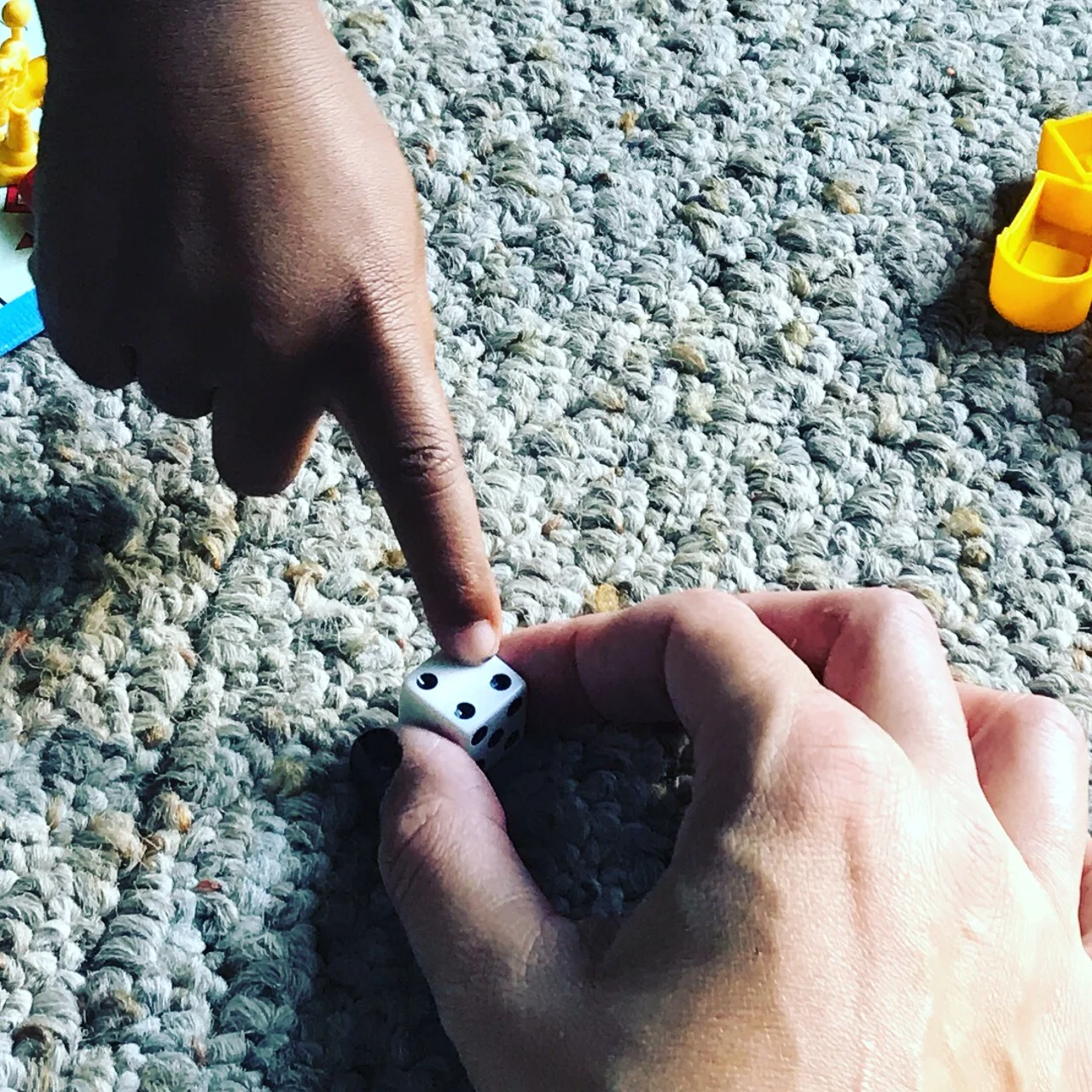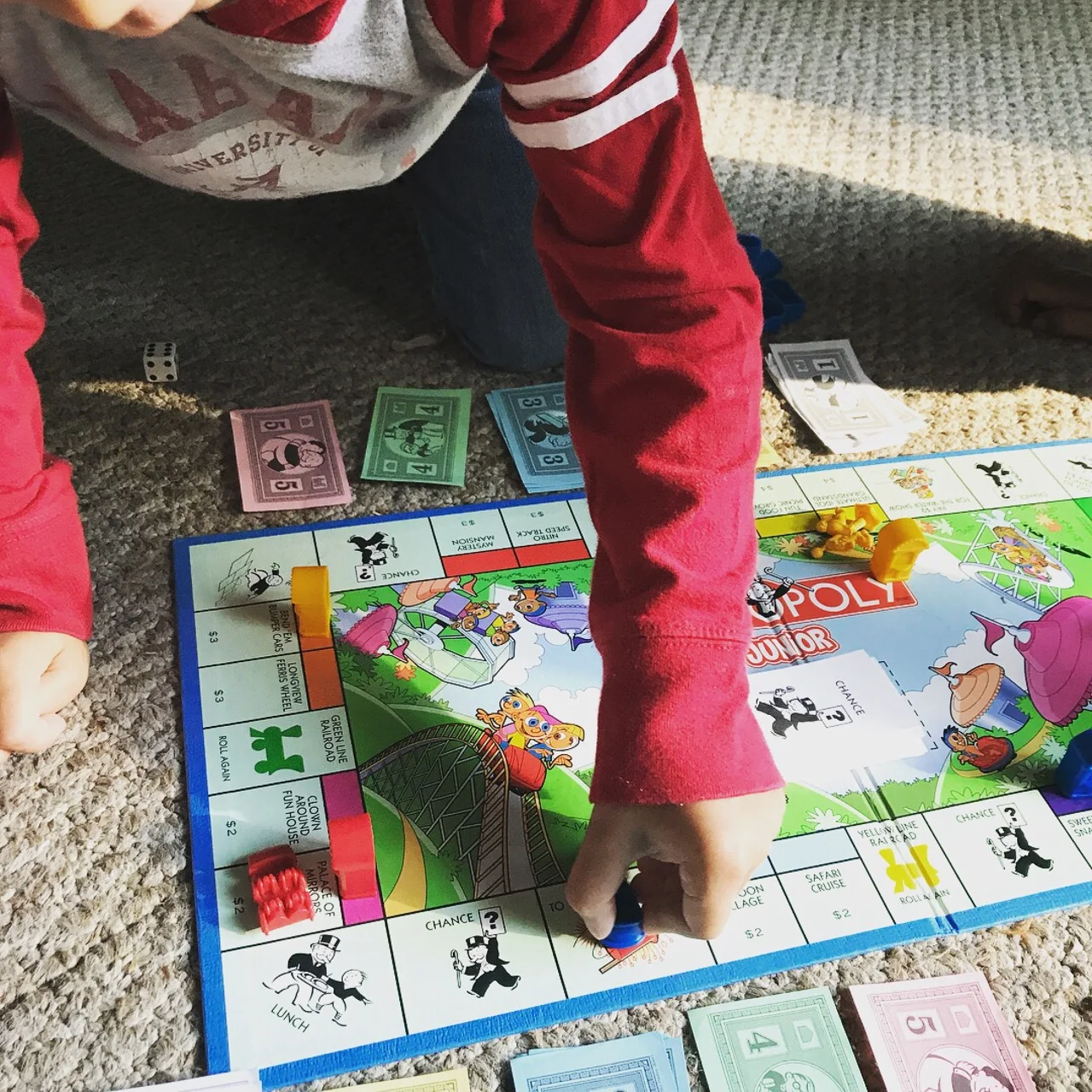Let's Play a Game!
Yesterday I said to the kids, "Let's play a game." "Yay! Let's Play Monopoly!"- this from my four-year-old. He's been really interested in Monopoly Junior lately. I love to play games with my kids, you guys, but oh, man, this one is not my favorite to play with littles. First of all, it takes forever- almost like regular Monopoly, so one game can seem to drag on for hours. It's like going down the rabbit hole! For another thing, even though he's getting pretty good at it, it's really NOT geared toward kids his age. Which can make it hard (and even harder if we're playing with more than one kiddo, like when we play with his five-year-old cousin), because it sometimes requires skills that he hasn't quite developed yet. So, why do I keep playing this game with him? Read on!
Games are a really important part of learning through play and they help kids develop a lot of good skills- starting from basic things like taking turns and counting all the way up through understanding money. I have for you a list of 10 important skills (social & math) that board game-playing promotes.
Taking Turns: Obviously, taking turns is a huge part of playing a game with other people. Everyone gets a turn, and typically in the same order. Every player has to wait for their turn.
Rule Following: Again, this one is pretty obvious. Every game has rules, and games only work if everyone follows the rules. In our house, if you want to play the game, you have to follow the rules. If you can't follow the rules and respect the other players, you don't get to play, and that's a bummer!
Connecting Actions with Consequences: Games can help kids see that actions have consequences: If I roll this number on the die, I get this piece; If I move to this space on the board, that person can jump my piece, and so on. In Monopoly Junior, if I get two ticket booths on one color, I get more money (and whoever winds up with the most money wins).
Maintaining Concentration & Staying With a Task: It can be hard for young kids to pay attention for long periods of time. This is one reason many board games are geared toward kids ages 6 and up. But many preschool games (think Don't Break the Ice, Ants in the Pants, etc.) are intended to play more quickly. Starting with easier games and working your way up can help kids learn to focus on a task. And it's always easier to focus if it's fun. Playing longer games is a great way to build focus, but just be careful not to try and force it! Sometimes Number Four ASKS to play Monopoly, but gets bored part way through. I can tell he's bored because he starts getting distracted, and at that point I usually just have him help me clean up and put the game away, and he doesn't really argue (which is a great sign that he IS, in fact, done).
Number Recognition: Many times, preschool games have numbers on the die rather than dots, which means the kids are practicing number recognition. When we play Monopoly, Number Four also has to recognize the numbers on the properties (the prices) as well as the numbers on the various dollar bills.
Counting: Any game that comes with a die or dice requires counting. We usually work on counting after the kids roll: the will count the number of dots on the up-facing side so that they know how many spaces to move. Which leads me to...
One-to-One Correspondence: Sometimes, even though kids can count aloud, they may not make the connection between the word "two" and the real-world application. Whenever the kids roll the die for their turn, we count the number of dots on the up-facing side, touching each one as we count. If we miss touching a dot, or count faster than their little fingers move, we go back and try again so that they make the connection between how many dots they SEE on the side and what number they counted to. Eventually, they will come to recognize how many dots are on the side without counting each one individually.
Counting On: This is an important skill to have and one that can be hard for kids to grasp. Playing games helps give kids a visual and tactile point of reference. Every time they have to move their piece on the board, they will practice counting on- the concept that you do not count the space you are currently on, but begin counting with the first move.
Basic Addition (and Subtraction): Right now with Number Four, we are working on adding up to five. Monopoly Junior is really good for this, because we have to do a lot of adding and subtracting when buying properties. A lot of times, he doesn't have exact change when he is buying a property. So, say he lands on a property that costs $5, but he has already used his one $5 bill from his bank. This is when we talk about what other numbers can make five. And, since this is a hard concept to understand in the abstract, we make it more real by counting on our fingers. For example, I might hold up 3 fingers on one hand and two on the other, and ask him to count them all together. This way he gets the visual of 3+2=5. Then, we find the bills that correspond to that math sentence. This works in reverse, too. If he is out of $3 bills and lands on a $3 property, he can pay with a $4 or $5 bill, and then we will talk about how many dollars he gets back... And that leads me to the next skill, which is:
Understanding Money: Games that involve the use of fake money (think Monopoly, The Game of Life, etc.), can help kids begin to develop an understanding of how money works. For example, Number Four recognizes that this symbol: ($) indicates an amount of money, that there are different bills and coins that are worth different amounts, and that sometimes we have to add bills/coins together to have the right amount of money to make a purchase, that sometimes, we have larger bills/coins than needed and in that instance we get money back. He also understands the concept of things costing money, and that different items cost different amounts of money.
Strategy (and planning ahead): Number Four understands that owning the costlier properties and also that getting his own ticket booths on both of the properties of one color mean that he is going to make more money (and thus has a greater chance of winning the game). Another example: we play a lot of Uno in our house, too, and my kids have figured out that using the special cards (skip, draw two, etc.) against the other players helps them to win, and will even plan out who they want to play those cards against (so, for example, they may purposely use a reverse card to change the direction of play BEFORE playing their other cards).
Understanding Directional Words: Many games allow players to move in directions other than just FORWARD. Having to move their piece around the board can help them understand directional words such as forward, backward, sideways, left, right, up, down, and even diagonal.
But do you want to know the biggest reason I keep playing this game with him? Because he loves it, and it makes him happy. It can be frustrating at times (not as much now as the first few times we played, but still), and sometimes we don't make it all the way through the game, but years from now, he's going to look back and remember all the times I dropped what I was doing to play the game with him. And that, my friends, is the most important part.

